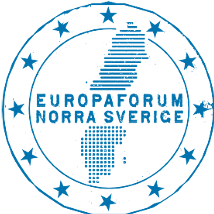Europaforum Northern Sweden (EFNS) is a network of politicians at the local and regional levels in Norrbotten, Västerbotten, Jämtland Härjedalen and Västernorrland. EFNS offers an arena to build common knowledge, analyse EU policies and discuss how they affect Northern Sweden. EFNS monitors European issues to influence EU legislation, EU strategies and action programmes, as well as the EU budget. The objective of EFNS is to safeguard the interests of northern Sweden in EU policies with communication aimed towards both the European institutions and the national level.
North Sweden calls for a strong Cohesion Policy for Europe
EFNS welcomes new and incumbent members of the European Parliament, as well as the new college of European Commissioners to share the task with local, regional and national decisionmakers all over Europe to build a resilient union with social and economic cohesion among the vast variety of European territories. Climate change, migration, global competition and growing geopolitical turmoil are challenges that calls for joint political action in every member state and at all levels of governance. The EU needs a continuous ambitious investment policy to boost innovation, create growth and jobs, increase accessibility, while transforming industries and promoting sustainability. The EU Cohesion Policy has proven to be a substantial tool for regions to tailor-made investments to fit the needs for capacity building, research and innovation, transport and digital infrastructure. The policy should be further developed during the next programming period to tackle global challenges and unlock potential for growth in every region.
- EFNS welcomes the proposal for Cohesion Policy 2021-2027
- EFNS urges the EU to maintain an ambitious budget
North Sweden welcomes extra support to overcome geographical handicaps
EU Cohesion Policy with the extra allocation to Northern Sparsely Populated Areas (NSPA) has been a decisive factor for regional development in north Sweden and has delivered added value and long term effects with growth of new business sectors, increased innovation capacity, increased commercialisation and internationalisation. The OECD stated in the territorial review of the NSPA that north Sweden is a strong contributor to growth in Sweden and Europe, and that there are even more potential to be realised with better conditions for innovations, more investments in transport and digital infrastructure, as well as more cooperation across borders. The European Commission’s report on investment priorities in the European Arctic states that north Sweden has an extensive need for investments in digital and transport infrastructure, support for development of SME’s in place-dependent sectors like energy, bio-economy, sustainable extraction and processing, and tourism. Finally, the European Commission stated in the Country Report for Sweden 2019 that the NSPA-regions are particularly vulnerable to shifts in global demand, face difficulties achieving critical mass, and difficulties to connect to markets. The EU Cohesion Policy has been and will certainly continue to be a key enabler in the efforts to overcome these structural challenges.
- EFNS welcomes the proposal to maintain the extra allocation for NSPA
- EFNS urges the EU to relief the NSPA from thematic concentration
North Sweden calls for an enhanced territorial dimension
EU Cohesion Policy should be based on the unique context and conditions of each region. Successful regional development and territorial cohesion requires place-based policies, cross-sectorial coordination and enhanced multi-level governance to enable growth and promote sustainable development across Europe. All programmes and policy areas should therefore be place-based to be more effective. There are plenty of room for improvement and efforts can to be made to enhance the territorial dimension, such as strengthen the European Code of Conduct on Partnership and safeguard the Partnership Agreement. North Sweden in the European Arctic, has unique possibilities that can be realised through the concept of smart specialisation, which is a genuinely place-based methodology for regional development. The proposal to emphasise smart specialisation during the next programme period is therefore particularly welcome.
- EFNS urges the EU to add a territorial dimension in the Code of Conduct on Partnership
- EFNS urges the EU to maintain a mandatory place-based Partnership Agreement
Adopted at Europaforum Northern Sweden in Brussels December 11, 2019
Anders Josefsson (M) Norrbottens Kommuner
Ann Åström (S) Region Västerbotten
Britta Flinkfeldt (S) Norrbottens Kommuner
Elise Ryder Wikén (M) Region Jämtland Härjedalen
Glenn Nordlund (S) Region Västernorrland, chair EFNS
Jan Sahlén (S) Kommunförbundet Västernorrland
Jonny Lundin (C) Region Västernorrland
Nils-Olov Lindfors (C) Region Norrbotten
Rickard Carstedt (S) Region Västerbotten
Robert Uitto (S) Region Jämtland Härjedalen
Thomas Andersson (C) Region Jämtland Härjedalen
Åsa Ågren Wikström (M) Region Västerbotten
